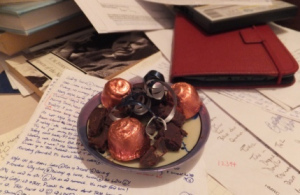Roz Morris's Blog, page 88
January 13, 2013
How to find the right title for your book – a brainstorming workshop
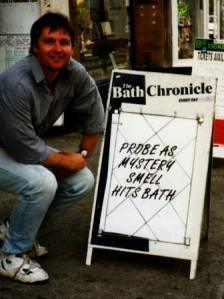
Jane Austen’s unfinished masterpiece
I’ve had this question from Kate Calcutt.
How important is the title of a book?
Good titles make you stop and wonder. Catch-22. Wow, what’s that? The Other Boleyn Girl. Wait, there were two? Nineteen Eighty-Four. Why then? What happens? (The book was published in the 1940s, so the forward-reaching, inverted date was startling.)
The more famous you are, the less hard your title has to work. Iain Banks graduated from The Wasp Factory to The Business. Would you have picked up The Business if it had been his first? Barbara Vine gets away with No Night Is Too Long because her name already tells readers what they’re getting. Which is just as well because No Night Is Too Long has zero stopping power and is darn hard to remember.
If you’ve got a long-running series, you can coast with the later titles. The first needs to audition with bells and whistles, but later titles can trade on insider knowledge. Mockingjay would be a challenge to remember unless you’d been primed by The Hunger Games. But it’s really a title that says ‘welcome back’.
But if you don’t have much already on the shelves, your title is your one chance to make a reader stop and consider spending time with you. It is your novel’s chat-up line in a place with hundreds of suitors. It needs to thrum with promise, intrigue.
Is this title okay?
Kate also said: I’m considering a title change from ‘In the Background’, to ‘Life, Captured’.
I’m afraid both of those fall at the first hurdle. They’re so vague that they can’t give a flavour of the book, and a reader is likely to pass them by in favour of a title that makes a strong case for what it’s about. Both these titles could describe just about any story.
Now, you might argue that we want our books to appeal to the widest number of readers. And I’m sure if there was a genre category called ‘for anyone who likes a good read’ we would all hope our book belonged in it. But marketing can’t be about ‘vagueness’ or ‘everyone’. It’s about specifics, individuals and distinctiveness.
Let’s get specific
So what are the specifics of Kate’s book? She described her novel to me as contemporary female fiction – the story of a woman’s life as observed by those in the background of her holiday photos.
Now this is an interesting concept and I can understand why she’s toying with those titles. But they didn’t make me want to pick the book up. In The Background might work with a stunning cover. But titles are seen just as often without their artwork, so we can’t rely on that.
So what shall we do to find a better title? We need to brainstorm.
I’m not saying I’ll get a better title in this post, but here’s a starter. Only Kate knows what really mirrors the soul of the book.
Find words that suggest photos, snapshots, images, likenesses, portraits. Exposure. Shot. Frame. Lens. Subject. Picture. I got down to ‘image’ and I found ‘angel’ – a nice emotive word. Photos aren’t the only interesting concept here. Let’s look up watchers, onlookers, witnesses. And moments. Even jigsaws, as this novel seems to present a life in pieces. Or chorus, as the piecemeal narrative is like the commentary of a Greek chorus. What about biography, as it’s the story of a life? Make a huge list of possible nouns.
Now start another list of verbs and adjectives that could go with those. You’re looking for something surprising or emotive. The blurred girl? Background is a good word if we use it strongly. Could that go with something?
Don’t stop with single words. List questions, enigmas, dilemmas that might arise from the book’s concept.
2. Go for the familiar – and twist
Find idioms that use all the words you’ve listed. And book titles – Amazon is useful for this, as is my beloved Library Thing. Song titles too. As good titles set up a frisson, you can get a powerful effect from altering a phrase that’s already familiar. Look at Anthony Burgess showing off (as ever) with a novel called Nineteen Eighty-Five.
In my scoot around LibraryThing I found a novel called Autobiography of a Family Photo by Jacqueline Woodson. That’s got an intriguing vibe so it’s definitely worth looking at other titles that are similar. There’s also The Photograph by Penelope Lively. The descriptions of these two novels necessarily explain the title, which could give you extra ideas to explore.
3. Look in the text
The perfect title might already be in your novel, hidden in a line of dialogue, or introspection, or a description.
4. Look at the genre
Your book needs to woo the right kind of readers, so you need to capture the right tone. Note, especially, the emotions that titles evoke – that’s the promise to the reader. And avoid misleading ones. Although ‘witness’ is good for the brainstorming list, if you put it in the title you might give the impression that it’s a crime novel.
A shortlist
Write a shortlist of titles. Force yourself to come up with many more than you need. Then put them away and come back when you’ve forgotten what they are. Try the best ones out on friends, then go back to Amazon to see how your shortlist compares with the books already out in the marketplace.
Repeat until satisfied.
You’ll find some more notes on titles in this post by Ray Harvey aka Journal Pulp.
Do you struggle to think up titles? Do you have any tips? Share in the comments! And if you want to continue brainstorming Kate’s book – or if you think of a possible title share it here!

January 8, 2013
‘I let the song dictate what I left unsaid’ – The Undercover Soundtrack, Reb MacRath
 My guest this week was an award-winning horror genre writer, but turned indie to try to write the sort of novel he loved to read. For several years he published nothing while he struggled with his new challenge – a high-octane blend of suspense, swagger, humour and romance. Looking for a way to humanise an unlikable hero he found a guiding light in Rod Stewart’s interpretations of American classics – a rocker thug who’d matured with surprising tenderness. He is Reb MacRath and he’s on the Red Blog today with the Undercover Soundtrack for Southern Scotch.
My guest this week was an award-winning horror genre writer, but turned indie to try to write the sort of novel he loved to read. For several years he published nothing while he struggled with his new challenge – a high-octane blend of suspense, swagger, humour and romance. Looking for a way to humanise an unlikable hero he found a guiding light in Rod Stewart’s interpretations of American classics – a rocker thug who’d matured with surprising tenderness. He is Reb MacRath and he’s on the Red Blog today with the Undercover Soundtrack for Southern Scotch.

January 6, 2013
How to strengthen a story idea
 I had this interesting question from Kristy Lyseng on Twitter: What would you do if you’ve tested your story idea and realised it wasn’t strong enough?
I had this interesting question from Kristy Lyseng on Twitter: What would you do if you’ve tested your story idea and realised it wasn’t strong enough?
Once upon a time, an idea caught your eye. You wanted to spend tens of thousands of words exploring it. Maybe you now can’t remember that, or the work you’ve done has left you weary and muddled.
If we’re talking about an idea that hasn’t been written yet, the first thing I’d do is make it new again. Recreate the gut ‘wow’.
OMG I must write this
I forget everything I’ve tried to do with the idea so far. I identify what grabbed me when the idea was fresh and new.
I also forget what anyone else has done with it, if they have. It’s easy to end up intimidated by other treatments, especially if I’m frustrated. I disregard all that and find what originally demanded I work with the idea.
I create a mood board. I write down random phrases, images, dialogue snatches that the idea suggests to me. As a shorthand I might note moments from other novels or movies, or snatches of music. Anything to capture the excitement I first felt.
Make it fun
The chances are, I’m disappointed with the pointless work I’ve done so far. Ideas will flow better if I’m not reproaching myself. After all, the original idea came unbidden.
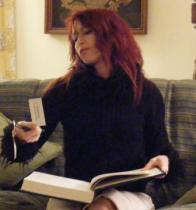 As much as possible, I make this process feel like play. Instead of typing on a computer, I write by hand. I often use the gaps in expired appointments diaries, scribbling notes in a different-coloured pen, or using the pages upside down. This lets me brainstorm without judging the results. Or I go somewhere I don’t usually write – cafes, a bench overlooking a view, a Tube train.
As much as possible, I make this process feel like play. Instead of typing on a computer, I write by hand. I often use the gaps in expired appointments diaries, scribbling notes in a different-coloured pen, or using the pages upside down. This lets me brainstorm without judging the results. Or I go somewhere I don’t usually write – cafes, a bench overlooking a view, a Tube train.
If you use Pinterest you could also start a board for your idea, but I’m not disciplined enough and will probably get lost on a browsing spree. 
Where to take the idea?
Once I’ve made the idea feel new again, I start thinking about where it can go.
I start new lists for
characters and what they want
themes
settings
dramatic events that fit with the idea.
Batteries recharged, I can now face looking at what others have done. I search on Amazon for books tagged with keywords. LibraryThing has even better tags – here’s the page for My Memories of a Future Life and its tags, which I can click on to find other books that tackle the same subjects. (I would do the same on Goodreads but haven’t been able to work out how.) I also use the website TV Tropes (here’s how I use it to fill gaps in my story outline). All these resources will suggest the kinds of events, characters, conflicts and quests I could have.
Importantly, they’ll also help me discard some possibilities. In the novel I’m working on at the moment, I get a heartsink feeling whenever I look over some of my notes. Clearly I’m not interested in that aspect of the characters’ world, even though other writers have tackled it. So I’ll play it down.
When is the idea strong enough?
Ultimately the idea is strong enough when I know:
who the hero is and who or what might oppose them
what people are trying to do
how it will get worse
what the setting is
why it will take a long time to reach a resolution
a rough structure – what kicks off the drama and various twists that will form the turning points. Sometimes I decide the end beforehand, or I let it find itself once I’m writing.
You might have covered all these bases but the story still seems limp. In that case, beef up the material you have -
increase the stakes so that the goal matters more to the characters
make it more difficult for them to get what they want
turn up the conflict between the characters.
You don’t have to get it all instantly

Compost – for now
This is important. Some ideas need to be shut away and wiped from your fretting brain. If the idea looks feeble, don’t junk it. Give it a sabbatical. The Venice Novel, which I talked about in the TV Tropes post, has worn out my ingenuity for now so I’ve put it in the deep compost department. Meanwhile another novel I thought I’d worried to shreds has – to my surprise – woken up with real substance. I’m working on the detailed outline. For now I’m calling it The Mountain Novel.
Partner it with another idea
Sometimes an idea doesn’t have enough juice on its own. But it’s still worth working it as far as you can. A few key elements in My Memories of a Future Life and Life Form 3 began as separate story ideas. Negligible on their own, they harmonised perfectly in a bigger work.
Don’t be afraid to restart
Sometimes we go wrong with an idea or get lost. If I’m in the early stages, trying to work out what to do with an idea, I return to the pure inspiration and look for a stronger angle. If I’ve already drafted and the story doesn’t seem to matter enough, I look at ways to turn up the heat. (Speaking of which, thanks for the distillation pic Brankomaster.)
Have you had to strengthen a story idea? What did you do? Share in the comments!
You can find tips for researching, outlining and what makes a robust story in my book, Nail Your Novel – Why Writers Abandon Books and How You Can Draft, Fix and Finish With Confidence. Available on Kindle and in print. Book 2 is now under construction – sign up for my newsletter for details as soon as they become available. You also might like my multimedia course with Joanna Penn – more than 4 hours of audio and slides with an 86-page transcription – find it here.

December 29, 2012
When you should write a sequel to your novel – and when you shouldn’t
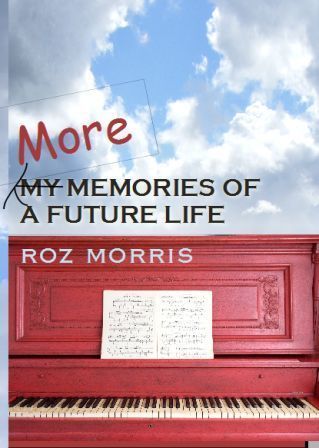 One of the sweetest compliments a writer can hear is ‘I loved your book, please write the sequel’. And we live in a sequel-minded world. If there are any sure-fire ways to build a readership, a series is one of them.
One of the sweetest compliments a writer can hear is ‘I loved your book, please write the sequel’. And we live in a sequel-minded world. If there are any sure-fire ways to build a readership, a series is one of them.
So if people are asking for a sequel and you hadn’t planned one, should you consider it?
Certainly, a lot of hard work has already been done. You know the characters. Indeed, you may have had trouble shutting them away once edits were done. The chance to shake them awake again may be hard to resist.
You might have plenty of material. Outtakes that you pruned from the original novel, back story you wanted to work in but, mindful of pace or the reader’s attention, you cut. They could all be used, couldn’t they?
Temptations
These are strong temptations, but they do not mean your novel should have a sequel.
Neither should you write a sequel because the reader has unanswered questions. At the moment, those are part of the novel’s resonance. If you answer them, would the magic disappear? Would your answers, in fact, be wrong now that this dimension of the book belongs to the readers?
What will create a story in your sequel?
Stories need a crisis. If you wrote a sequel, where would this new crisis come from?
In some genres, crisis comes with the territory. It’s a natural hazard of the characters’ job, heritage, world, race, DNA and dynasties etc. With those ingredients, your characters will have stories for ever more. Write them, and enjoy their rich variety.
Other novels, particularly non-genre, tend to be self-contained. The arc of the book was the defining experience of the characters’ lives. You wrote ‘The End’ when this was resolved, as much as possible. If you then put those characters through another story with a shift of similar magnitude, will that be hard to believe? And if the characters don’t have a fundamental disturbance, will they be interesting to read about? Remember, they’ve got to match up – or even surpass – the frisson of the original. But it can be done. Think Toy Story 3.
Should you reassemble the original cast? In a genre novel you might have a team who will always be thrown together. Indeed they might create a pseudo-family who give each plot an emotional core while they deal with the crisis du jour. At the end, they reassemble, tested, battered and wiser.
But in other novels, it may be better if the characters disperse. Daphne Du Maurier’s Rebecca has some perfectly ghastly sequels. Obviously licensed by the estate in an attempt to milk the fans, they squeal a warning for all would-be sequelers. They’re novels constructed by tick-boxes, contriving to drag the scattered characters out of contented retirement and flogging them onto the same treadmill again. In most cases they’ve already given their best, first time round. Leave them be.
Think obliquely
So straight sequels may be dodgy, but you might have good mileage in a spin-off. While the principals from book one may be living a better-adjusted life, others could take centre stage. The original characters could be cameos to advise, steer, perhaps muddle everything up because the new crisis is not like the thing that happened to them.
Another possibility is to write the ‘missing years’ or a prequel. Perhaps one of your characters had an interesting interlude from far earlier in their life. Or if your original narrative was first person, perhaps there were other good stories happening around the corner.
Just one character
You might have a central character who still has a lot to offer. This is particularly true of catalyst characters, who stir up trouble but don’t change very much themselves. Throw them into a new situation and they will cause another maelstrom, just because. I get regular requests to write more about a certain catalyst character, who seems to inspire much speculation.
Not wanting to leave
Sometimes we writers want a sequel just as much as the readers do. But we have to take a look at what we would offer. After I finished with My Memories of a Future Life, I spent weeks doodling with aftermath scenes. They were indulgences, from a writer trapped in the deep end, struggling to surface. At the time, I intended them to be a continuation of the narrative but they went nowhere. The characters had stopped opening their hearts, as if what happened next was none of my business. Or perhaps I hadn’t found the right things for them to do.
It’s certainly possible that some of the Future Life people will rear up with a new urgent story. If they convince me that a lot more must be said and done, I shall write it without hesitation.
Until then, there are other stories I need to tell.
Are you tempted to write a sequel to your novel? If you’ve read sequels, what have you liked and what has made you wish the original was left alone? Share in the comments!
If you’re working up an idea for a novel, you might find some useful tips in my book Nail Your Novel: Why Writers Abandon books and How You Can Draft, Fix and Finish With Confidence. And in that case, I find I have plenty more to say and so a second Nail Your Novel is under construction. If you’d like information, sign up for my newsletter.


December 24, 2012
Predictions for writers in 2013 – and guest post at On Fiction Writing
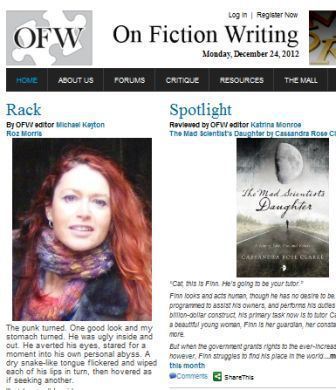 Everyone’s writing prediction posts right now. I wouldn’t have dared, except the website On Fiction Writing asked what I thought might happen in the industry in the next five years.
Everyone’s writing prediction posts right now. I wouldn’t have dared, except the website On Fiction Writing asked what I thought might happen in the industry in the next five years.
Obviously writers can’t be oblivious what’s going on in publishing, but if you look at what’s changed in the past two years, do we have a hope of predicting anything with accuracy? Anyway, who would trust the predictions of anyone who makes things up for a living? Worlds, economies, social movements roll out of our imagination to suit whatever story we want to tell. (And I see they put my interview next to a novel called The Mad Scientist’s Daughter. Adorable cover anyway.)
The only certainties I can predict – for myself and for other writers in 2013 – are these.
I will need to weigh up several new social media environment and decide if they’re worth the effort. I will need to remind myself that once upon a time I was scornful of Twitter, Facebook and even – gasp – blogging.
I’ll need to embrace at least one new platform for publishing, on a device that I don’t see the need for. I will have to remind myself that putting Nail Your Novel on Kindle turned out to be a brilliant move.
I’ll never decide what’s worthwhile unless I have help – which I will probably find by firing off a tweet or a Facebook post to all you guys.
I’ll get stuck on the novel I’m writing, and when I think all is irretrievably lost the answer will fall effortlessly onto the page. (I talk about writer’s block in my interview, in case you’re wrestling too.)
I’ll discover several writers whose work contains such insight, I will not know how I did without them (I talk about favourite writers too)
Predictions aside, I’m also talking about self-publishing, publishers developing new roles as partners for indies, finding readers – and ghostwriting. Do join me there and if you’re in a predictive frame of mind, leave a comment here with conjectures, projections and outright fabrications and fantasies for writers in 2013.


December 20, 2012
A Christmas newsletter for modest authors – post at Authors Electric
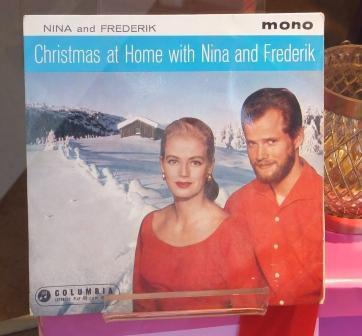 On this blog I try to cover all your writing needs. Including the short but painful requirement to brag about your year’s achievements to your Christmas card list.
On this blog I try to cover all your writing needs. Including the short but painful requirement to brag about your year’s achievements to your Christmas card list.
If smugness isn’t as natural to you as it is to Nina and Frederik here, you might need some help. So today at Authors Electric I’m giving tips to get you started. Do drop in.


December 18, 2012
‘I hear these songs and see the flawless story I wanted to write’ – The Undercover Soundtrack, KM Weiland
 One of my earliest Undercover Soundtrack guests returns this week with a brand-new novel – and another beguiling musical journey. The story features a character whose life spans two timelines, which she envisaged in her head as having a soundtrack of two personalities. Aggressive guitar, driving percussion – softened by the melancholy lyricism of early Celtic folk songs. But she’d never heard such a thing in real life – until a chance listen one day expressed exactly what she’d been looking for. She is KM Weiland and she’s on the Red Blog talking about the Undercover Soundtrack for her newest release, Dreamlander.
One of my earliest Undercover Soundtrack guests returns this week with a brand-new novel – and another beguiling musical journey. The story features a character whose life spans two timelines, which she envisaged in her head as having a soundtrack of two personalities. Aggressive guitar, driving percussion – softened by the melancholy lyricism of early Celtic folk songs. But she’d never heard such a thing in real life – until a chance listen one day expressed exactly what she’d been looking for. She is KM Weiland and she’s on the Red Blog talking about the Undercover Soundtrack for her newest release, Dreamlander.


December 16, 2012
How to add jeopardy to your story before the main conflict starts
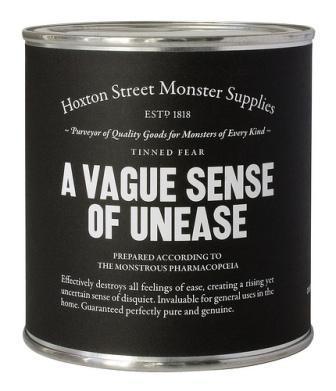 Jeopardy is a sense of instability – and a powerful way to hook the reader.
Jeopardy is a sense of instability – and a powerful way to hook the reader.
Often, writers are gearing up to reveal a big threat in the meat of the story, but fail to give us enough in the early chapters. Instead they show the characters living their lives, surrounded by their important folk. They may show us back story, and what the characters don’t want to lose. This is all useful groundwork – but they are in a state of stability.
What’s missing is the sense that the character is venturing onto a tightrope. The unknown knocking at the door. The trampoline on the balcony.
Genre and generalisations
How obvious you make this instability depends on your readership. Children’s and YA novels have to be pretty literal, while literary novels for adults might create pressures of agonising subtlety. Passages that would be aimless cogitation in a thriller might be enthralling dissonance in another genre.
But whatever you are writing, you still need jeopardy. So if your characters are looking too comfortable, what can you do?
Cut the throat-clearing
The simplest answer is to ditch the throat-clearing and get to the main threat sooner, then generate some complications to spin out afterwards.
Foreshadow with mysterious symptoms
But you might be better to keep your main conflict where it is. In that case, you need a build-up – but one that isn’t aimless.
Start from your main conflict and spin it out backwards, creating less severe problems that will lead to the flashpoint. Like mysterious symptoms that warn of a medical catastrophe, these can give that tingling sense that the character’s world is becoming irretrievably unstable.
Is there any normal activity that they start to find more difficult? Is there a tricky choice they might have to make early on? And could the character handle these in a way that makes everything more precarious? Could they think they’ve sorted it out but find they’ve made it worse?
Sometimes writers try to add jeopardy with a deadline. The gangsters are coming. Or the bomb will detonate. That can be effective if introduced late, but plot timebombs have a short shelf life. If you start them ticking too early and never escalate the problems in another way, the reader can get numbed.
Other characters
Other characters are a terrific source of instability. Is there something your main character has to do that puts them at odds with other people who are important to them?
When I fixed Life Form 3, I looked closely at the other characters. I found:
relationships where there was tension, and I made more of it
ways for characters to spoil things for each other
a way to give an early warning of the main threat, by making a diluted version afflict another character
I also looked for where this new, more desperate situation might lead to alliances. This gave one character a much stronger role, and became a catalyst for other tensions that richocheted through the story. He emerged with some strong beliefs that made him a far bigger player than he was originally designed to be.
Stories need a sense of instability to tweak the reader’s curiosity. If you need to add more, you can often find the roots in your main conflict and characters.
Thanks for the canned unease pic Ministryofstories.
Have you had to add jeopardy to a story – and how did you do it? Let’s talk in the comments!
If you found this post useful, you might like the follow-up to my book Nail Your Novel. It’s currently in edits and I’m still debating the title, but it will be stuffed with craft advice. If you’d like updates about this and Life Form 3, sign up to my newsletter


December 12, 2012
‘Emotive music explains the terror of the people’ – The Undercover Soundtrack, Liz Fisher-Frank
 My guest this week turned to writing novels after long years as a children’s rights lawyer representing teenagers in care. Her fiction debut, Losing Agir, was launched on Human Rights Day and is a teen thriller about a child in care and a refugee who unite to seek justice. Music helped her connect with the realities of her displaced characters’ lives, especially experiences that most of us take for granted – such as a family Christmas. She is Liz Fisher-Frank and she’s on the Red Blog talking about Losing Agir and its Undercover Soundtrack.
My guest this week turned to writing novels after long years as a children’s rights lawyer representing teenagers in care. Her fiction debut, Losing Agir, was launched on Human Rights Day and is a teen thriller about a child in care and a refugee who unite to seek justice. Music helped her connect with the realities of her displaced characters’ lives, especially experiences that most of us take for granted – such as a family Christmas. She is Liz Fisher-Frank and she’s on the Red Blog talking about Losing Agir and its Undercover Soundtrack.


December 9, 2012
How to ignore an editor’s suggestions and still fix your novel
 When my agent took my second novel Life Form 3 he mostly adored it – but felt the main threat took too long to develop.
When my agent took my second novel Life Form 3 he mostly adored it – but felt the main threat took too long to develop.
A publisher was interested so we had a meeting. In a creative, convivial afternoon, we brainstormed ideas. I took reams of notes. But in the end I did nothing they suggested. Not one thing.
They were right
At home I made a beat sheet (one of my all-time lifesaving revision tools, explained in Nail Your Novel). It had been a while since I’d read the manuscript. The beat sheet showed that too much of the first half was atmosphere instead of story. My esteemed colleagues were right that it was slow.
They were wrong
But they were disastrously wrong about how to pep it up. ‘Let’s have a character on the run, a threatening political movement in the wider world of the book, another sub-plot to keep characters busier’… All sorts of plot fireworks, all out of kilter and unnecessary. I knew the central character had a compelling major problem and that the action must come from that, not from a carnival of chaos around the edges.
So how did I fix the book?
As always, the best insight came from examining why I wrote the story the way I did – made possible by the beat sheet (left, with fortifying accessories). I included those slow scenes for a good reason – to introduce ideas and threats that would emerge later. I’d made them strange and intriguing, but I now saw they didn’t have enough momentum in themselves. They didn’t immediately generate interesting situations.
I’d known I was in trouble
I had even suspected they were weak, so I’d tried to solve it with false jeopardy. I confess I made the main character worry that nasty things could happen. I now clutch my head in shame – these extended periods of worrying were not jeopardy, they were nothing darn well happening.
I even realised this, and tried to atone by making the main threat bigger. In hindsight it creaked with desperation.
Agent and publisher were nice enough not to say any of this. Perhaps they didn’t notice or mind. Perhaps only I knew how bad it was, because I knew my desperate motivations.
Unpleasant as it was to examine my writerly conscience, the answers helped me decide what to keep, what to add and what to adjust.
Better. Stronger. Faster.
I returned with a leaner, stronger Life Form 3. A really compelling read, said my agent – not noticing it was actually longer. He didn’t give a hoot that I’d ignored his suggestions. He didn’t even remember them. Unfortunately the publisher’s imprint closed that month – so Life Form 3 was out in the cold again. But that’s another story.
Editorial suggestions
Some writers hate it when editors, beta readers et al make suggestions. I don’t – I welcome them as oblique illuminations from the surface to the murky deep. And if you’re new to the writing game, or need to fit an unfamiliar genre, there’s much that a savvy editor can do to guide you.
But you mature as a novelist by understanding your own style and your individual ways – which includes how you handle your material and second-guess your own process. In a talk given at BAFTA, screenwriter, playwright and novelist William Nicholson said it’s the editor/producer’s job to tell you something’s wrong, and the writer’s job to find out what that is.
Before you act on revision notes, reread your manuscript and examine why you wrote what you did. This is how you stay true to your novel – and how you come into your own as a writer.
Thanks for the camel pic Loufi
In my next post I’ll discuss in detail how to add jeopardy to a story. In the meantime, let’s discuss -
Have you had detailed editorial advice on revisions, and how did you approach it? Do you appreciate it when editors chip in with changes they think would improve a book?
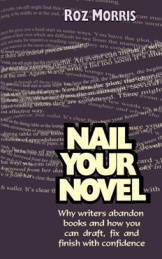 You can find my beat sheet in my book Nail Your Novel: Why Writers Abandon books and How You Can Draft, Fix and Finish With Confidence. A second Nail Your Novel is under construction – if you’d like information, sign up for my newsletter.
You can find my beat sheet in my book Nail Your Novel: Why Writers Abandon books and How You Can Draft, Fix and Finish With Confidence. A second Nail Your Novel is under construction – if you’d like information, sign up for my newsletter.
And – spoon tapping on glass – this week I had an email from CreateSpace telling me that demand for the print edition has been so high that Amazon placed a bulk order so they have enough stocks for Christmas. Who says indies are killing print? 






